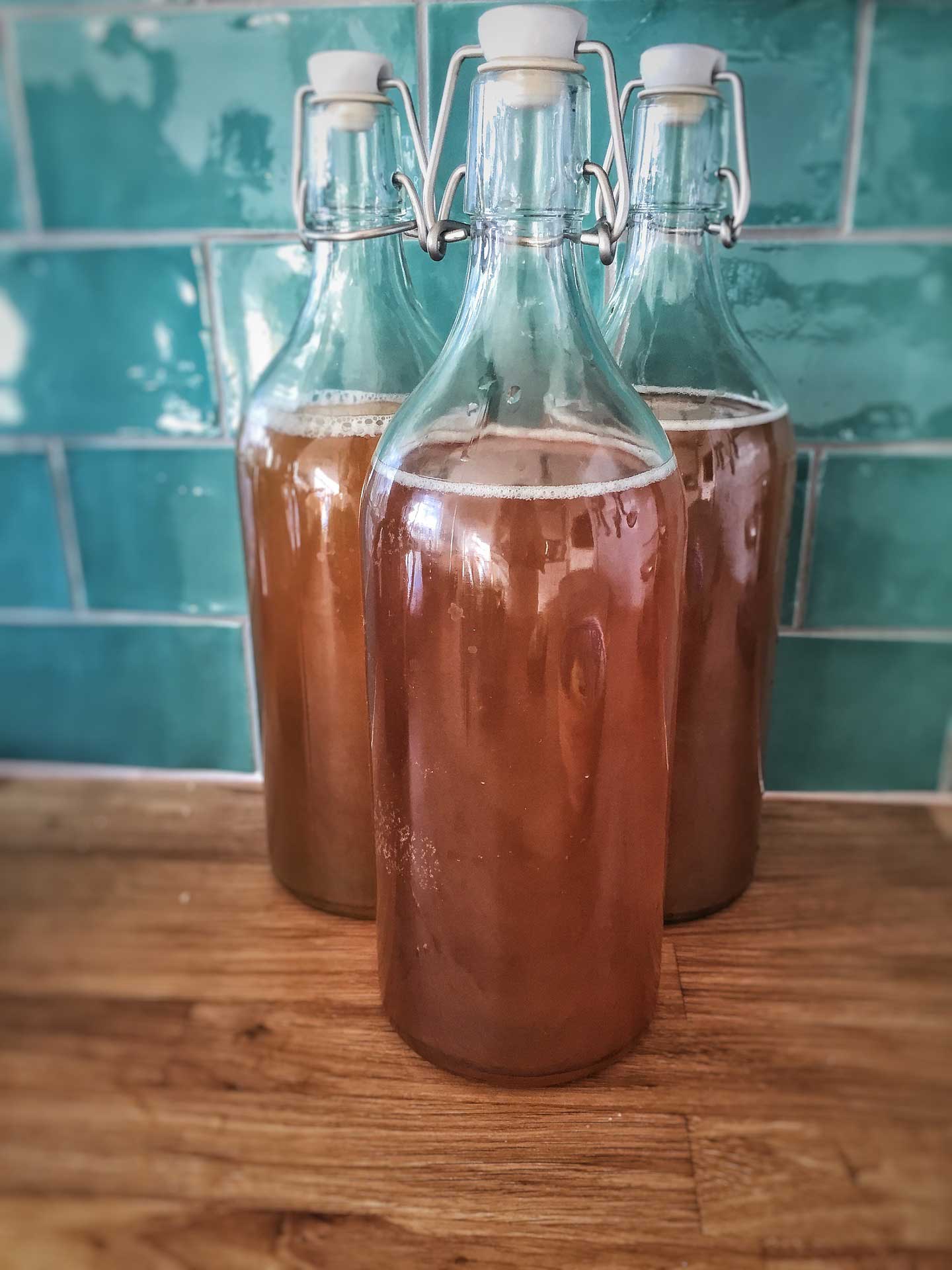Kombucha is the new matcha. Although Kombucha is not a new trend, in the last couple of years its popularity is undoubtedly rising. There are more and more commercial Kombucha drinks, all labelled as a super healthy drink. The list of benefits of kombucha is long, but they are mainly based on common beliefs, rather than scientific evidence. Is kombucha a healthy tea?
What is kombucha?
The history of Kombucha is uncertain. Many sources say it’s been around for 2000 years, but there is no real evidence to support this legend.
Kombucha is a fermented drink made from loose leaf tea or teabags, sugar, yeast and bacteria. It’s rich in bacteria said to be good for health, especially digestive system. Fermented foods have been around for centuries. In fact, some fermented foods have been a part of traditional cuisine of many countries, like kimchi in South Korea, miso in Japan, or kefir in Russia and other European countries. However, kombucha is more of a healthy than traditional drink.
Fermented foods are popular because they contain “good” bacteria that may keep your digestive system healthy. Besides, some are very tasty. With kombucha, things get more complicated. It is widely available in many food stores and can be made at home. Commercial versions are much tastier than home-made drinks, but most people interested in health benefits of kombucha will rarely care about flavor. Sugar and other ingredients can improve the taste as well.

Top Benefits of Kombucha
The benefits of kombucha have not been scientifically proven. However, if you want to test them yourself, to avoid all possible side-effects, it’s better to buy ready-to-drink kombucha. There have been several cases of poisoning, fungal infections and metabolic lactic acidosis[1]. Apparently, even one kombucha-related death has been reported[2]. Kombucha is made from SCOBY (symbiotic colony of bacteria and yeast), that is transferred from one person to the other, with no quality control and usually made in non-suitable environment. However, commercial, professionally brewed kombucha drinks are said to be completely safe. What could be their benefits?
Curing Cancer
Just like green tea, ginger, turmeric, blueberries, chia seeds and hundreds of other vegetables and/or super foods, Kombucha is also said to protect against cancer. This could b related to tea polyphenols[3], rather than bacteria and yeast alone. However, with Kombucha, things go a bit further as some sources claim it can actually cure cancer. There has been no evidence to support this claim.
Healthy digestive system
Keeping digestive system healthy might be the most mentioned benefit of kombucha. Kombucha is said to contain healthy bacteria beneficial for a healthy gut. That is, if you know what is in your tea. With home-brewed kombucha it is very difficult to know what kind of bacteria and yeast you will be ingesting. Moreover, Kombucha contains different strains of bacteria and yeast from other fermented food, and there is still not enough evidence to support any of those claims.
Detoxifying
Kombucha is often a drink of choice for detoxing. It’s still unclear if it has any benefits at all. From a non-medical perspective, detoxifying regimes should not include sugar, alcohol, caffeine and unknown substances (when home-made). Kombucha has all of them, except bad bacteria is brewed professionally. Although alcohol level is extremely low, it does contain some, due to a fermentation process. Sugar levels are also low, but not neglectable if you want to remove sugar from your diet.
Antioxidant activity
Kombucha is thought to have combined benefits of both probiotic drinks and real tea. Again, there is little to no evidence supporting those claims. The most recent study from December 2018 compared green, black and rooibos tea in making kombucha drink, and concluded that this fermented drink made with rooibos tea might have “an important effect on the recovery of oxidative damage on fibroblast cell lines against oxidative stress.”[4].
These are only some of the most commonly found benefits of kombucha tea. Other include improving overall immune system, lowering cholesterol, supporting weight loss, energy enhancement, reducing liver toxicity, reducing PMS symptoms, relieving stress and improving mood.
So, are all benefits of kombucha false?
Not necessarily. If you plan to include any drink, tea, or food into your diet for self-healing, talk to your doctor first. It is very important to know exactly what you are ingesting. Kombucha Is still a new drink, despite a legend saying it has been around for 2000 years. A study from 2014 stated that “there has been no evidence published to date on the biological activities of kombucha in human trials.”[5] So, should you drink kombucha? Yes, why not. If you enjoy the flavor and can see the benefits on yourself, you can include it into your diet. But, don’t expect miracles and try to stay away from suspicious home-made drinks or SCOBY’s of unknown origins.
[1] https://www.ncbi.nlm.nih.gov/pubmed/29197835
[2] https://www.cdc.gov/mmwr/preview/mmwrhtml/00039742.htm
[3] https://onlinelibrary.wiley.com/doi/full/10.1111/1541-4337.12073
[4] https://www.ncbi.nlm.nih.gov/pubmed/30577416
[5] https://onlinelibrary.wiley.com/doi/full/10.1111/1541-4337.12073



Leave a Reply Cancel Reply